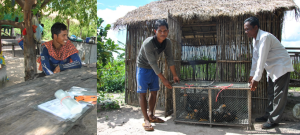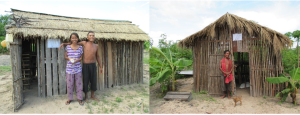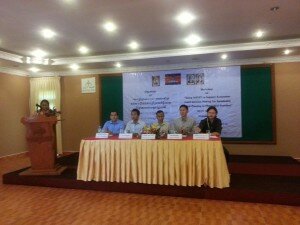Stories of Change: Othom Village, Kampong Thom Social Land Concession
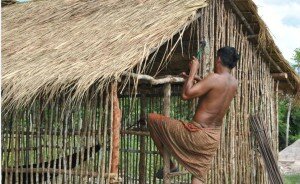 Cambodian Land Recipients Raise Chickens to Improve Livelihoods
Cambodian Land Recipients Raise Chickens to Improve Livelihoods
24 August 2015
“After receiving training, I had a new desire to raise chickens,” said Yem, an Othom Village land recipient.
In every direction one looks in Othom Village, chicken pens and gardens line the villagers’ houses. Chicken raising is now a priority and new interest for the people of this social land concession village in Kampong Thom, according to a recent agro-ecological assessment and agriculture needs assessment.
At the end of July 2015, 36 villagers – a majority which were women, attended a training on chicken raising practices provided by GIZ’s Livelihood Improvement and Food Security Project, in coordination with Cambodia’s provincial Department of Agriculture.
“Previously I raised 50-60 chickens, but I did not know how to take care of them and protect them from being stolen,” said Yem in a recent interview. “Now after learning chicken raising techniques, I have built stronger pens that will protect my chickens from other animals. I also know how to prepare chicken feed and how to keep them healthy.”
The project provided 10 local chickens to the households that successfully built chicken pens as a result of their training. As an incentive to get others in the village involved, chicken farmers will give 4 new chickens after reproducing (half kg per chicken) to other neighboring households who are new to the chicken raising business.
Presently, there are 35 households with chicken pens. An additional 31 households are waiting for their new chickens.
“My goal is to raise 2,000 chickens. I want to have my chicken raising business at home and then I will focus my seasonal work on the other 1 ha of cashew nuts and 0.5 ha of rice fields on my farm. If I can achieve this, I will no longer need to migrate for work,” said Yem.
![]()
Improving the Management of Conservation Hotspots in Cambodia through Integrated Spatial Planning and Innovative Modelling Tools
30-31 July 2015
Sen Monorom, Mondulkiri Province, Cambodia – This July 50 representatives from government, academia, international organisations and civil society attended a workshop to discuss the possibility of using modelling software to better inform decision makers regarding the sustainable territorial development within their jurisdiction.
The two-day workshop, initiated by the provincial administration of Mondulkiri, WWF, the Royal University of Phnom Penh, and GIZ Land Rights Programme II, reviewed the possibility of using the modelling software ‘InVEST’ for sustainable spatial planning. More>>>
Improving the Management of Conservation Hotspots in Cambodia through Integrated Spatial Planning and Innovative Modelling Tools
30-31 July 2015
Sen Monorom, Mondulkiri Province, Cambodia – This July 50 representatives from government, academia, international organisations and civil society attended a workshop to discuss the possibility of using modelling software to better inform decision makers regarding the sustainable territorial development within their jurisdiction.
The two-day workshop, initiated by the provincial administration of Mondulkiri, WWF, the Royal University of Phnom Penh, and GIZ Land Rights Programme II, reviewed the possibility of using the modelling software ‘InVEST’ for sustainable spatial planning. The tool named ‘InVEST’, applied by the Royal University of Phnom Penh for the territory of Mondulkiri Province, is a suite of software models used to map and value the goods and services from nature that sustain and fulfill human life.
The workshop served as a starting point to analyse if and how the tool could be used for integrated spatial planning in Mondulkiri. The province is one of the few areas with natural primary forest and important hotspots for biodiversity conservation and indigenous people communities. Researchers from the Royal University of Phnom Penh presented the InVEST initiative, with insight on the current outputs on several ecosystem services including:
• Biodiversity, habitat quality and non-timber forest products;
• Carbon storage and sequestration; and
• Water yield, nutrient and sediment retention
Subsequently, scenarios for three different land use and land cover futures including “conservation”, “green economy”, and “business as usual” were presented, based on forest cover and agro-industrial development data.
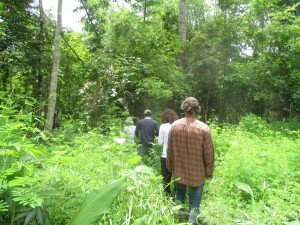
GIZ team during a field visit to near-by WWF supported indigenous communities that sustainably collect honey and harvest bamboo.
The “business as usual” scenario emphasized the need to plan the management of the provincial territory in a more sustainable manner. Since Mondulkiri is facing severe problems regarding deforestation and land degradation, as well as conflicting claims for land, this potential future would lead to immense degradation of land and various ecosystem services. The land rights of indigenous communities would also be further threatened.
In a second session, Battambang Province and GIZ Land Rights Programme II, shared their success stories and experiences in spatial planning. The Ministry for Land Management, Urban Planning and Construction, represented by H.E. Dr. Meng Bunnarith (Deputy General Director), gave insights into technical and legal aspects of the spatial planning mechanism.
Linkages and synergies between the InVEST and land management through spatial planning were discussed. Participants from Mondulkiri expressed their wish for an integrated spatial planning approach, to develop the province and manage their rich natural resources in a sustainable manner.
![]()
